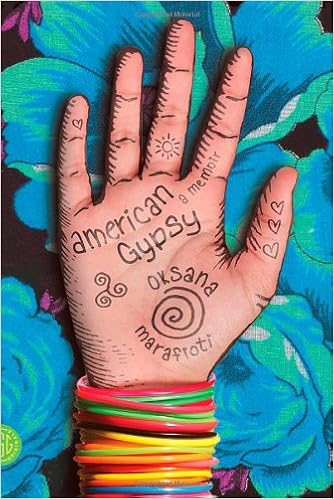Before I launch into a proper review of Oksana Marafioti’s American Gypsy, a word about terminology. Marafioti never discusses, in the course of her book, her use of the term gypsy. However, many many many Romani people consider it to be an ethnic slur; and when the word appears in the course of this book, it’s more often than not being thrown at Marafioti or at her family as an insult. So although Marafioti herself has said that she’s not opposed to the use of the term, I’m going to stick with Romani throughout this review. And so should you, probably, in your regular life.

Oksana Marafioti moved to America from Russia as a teenager, whereupon her parents immediately got divorced. A driven and talented kid, she worked hard to master English and find a place in a magnet school for the musically gifted. Meanwhile, at home, her mother was sinking further into alcoholism, and her father and stepmother cheated on each other and conducted exorcisms and tried to find a suitable Romani husband for the “practically a spinster” 16-year-old Oksana.
So, okay, as a rule there is a type of memoir I will read and a type of memoir I will not. I will read a memoir about what it is like to have a life that is not my life, like if the person decides to give it all up and join the circus and the book is about what happens next. I will not (again, as a rule) read memoirs about growing up with a fucked-up family. Used to read those. Kinda don’t anymore. They bum me out cause like, what do the fucked-up family think about ending up in your book? I’ll make an exception if someone promises me extreme hilarity (cf. Can’t We Talk about Something More Pleasant), but apart from that I am off Family Dysfunction Memoirs and only read Particular Experience Memoirs.
American Gypsy is right right right on the line between those two things. Marafioti mostly wants to talk about what it was like growing up in a Romani family with a long and stories musical legacy, and then being suddenly torn away from that part of her part and transplanted to a whole new country. She does have, in many ways, a fucked-up family, but the story is less about how they made her feel and more about what her life was as a Romani kid in Russia and in the US. But I mean it was right on the line.
SO are you Team Family Dysfunction Memoirs or Team Particular Experience Memoirs, or are you on a third team I haven’t thought of? LET’S MAKE A TAXONOMY.
Oh, also, if you have any recommendations of good nonfiction books about Roma history and culture, I am accepting those recommendations at this time.